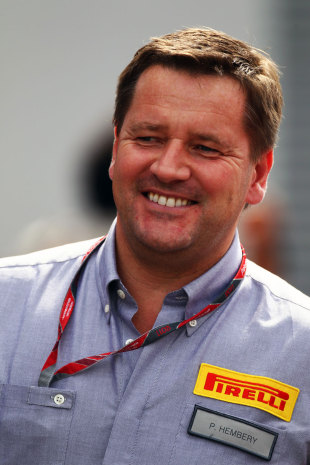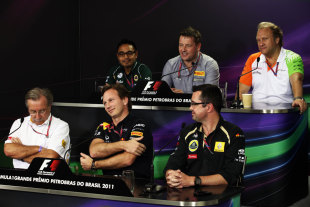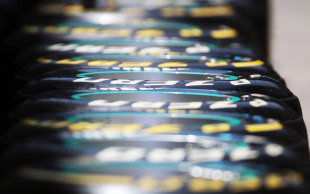- Paul Hembery Q&A
Pirelli pushing on
Paul Hembery talks to ESPNF1 about how Pirelli intends to be even more aggressive to keep the racing exciting in 2012

- In Focus:
- Tyres
It's fair to say 2011 was a big success for Pirelli; did things pan out the way you had envisaged and planned ahead of your return to Formula One?
I guess it came through a bit better. I'm not going to say it was a risky strategy at the start but I think it was an adventurous one, a brave one to try to change the way tyres were used in F1 and try and bring the tyres in to the strategy of the race weekend. At the start that was a big change for everybody so people were maybe a little bit surprised by that but as the season went on people were enjoying it. It became one of the elements along with DRS and KERS that gave the racing a little bit of a push last season, so overall we have to be very happy. We had great feedback from the teams and the fans, and the viewing figures were going up so I think from that point of view we feel we delivered.
You stopped short of saying you took a risk, but actually how worried were you at the start of the year?
We obviously had back-ups so we knew that we could go to a one-stop race and make it a bit boring if we wanted to. But we wanted people to buy in to it, and I have to thank the teams; eventually they got it and were supportive, and it was them of course who had asked for it! It was something that they gave to us as a challenge, so we just wanted to make sure that got communicated. We did work very hard with the commentators and the press to try and explain what we were doing and why we were doing it and maybe after three or four races people got it.
How did that success equate off the track - did it meet the targets set by the company for its road tyre sales and brand awareness?
Certainly brand awareness and brand appearance exceeded our expectations - I don't think there's any doubt about that. Sales are obviously harder to link with motorsport success. What I can say is that the company growth was substantial in 2011, part of that we would like to think was related to our Formula One efforts. I would love to be able to tell you that it was only due to Formula One but in reality there was a lot of good work going on in the company elsewhere. In terms of supplying the premium car segment we've got some fantastic new factories so all those elements come together and Formula One was really - I wouldn't say the icing on the cake - a way of qualifying our position in the premium segment of the tyre market.
It must have been a very different winter so far compared to last year; we all know the teams are working flat out on their new cars, how has Pirelli been spending the last six weeks?
Last year because we were new we created a bit more news. I guess now we're the known partner so we won't be shocking everyone quite like we did last time! We're looking at other championships as well, not just F1 if I'm honest. We're preparing for next season; we've got a good idea of what we need to do. We're trying to be more adventurous with some of our choices between the compounds, we're trying to get the performance differences between the compounds closer together so that the strategy is even more involved. Until we start seeing the new cars and understand what the effect of the regulation changes is on the cars then we still won't really know if our work's done. We don't exclude ever making changes during the season, it's entirely feasible if we find that we've been too aggressive or too conservative that we can realign ourselves in-season to try and deliver what the teams are asking us to do and what the promoter's trying to do. We've had a rest to be honest - a lot of us haven't had a holiday in 20 months at a guess - so for a lot of us it was 'We made it, we got there, we delivered' and just have a rest. But it all starts again now and we're obviously setting up for the winter test sessions in a few weeks time.
Paul Hembery on the 2012 strategy
What are the main changes you have had to make ahead of the start of testing?
Well we made it a little bit easier for the teams by using a particular soft compound all through the season, so they always had a central product which allowed them to optimise either the chassis set-up or the driving style. Another year we won't do that. We'll be mixing the compounds a lot more, the compounds will be more aggressive, performances will be more aggressive. But as I said earlier we don't really know until we get testing what the true effect of the new car layout will be; what will be the vertical loads we're going to get from the cars? What stresses are the tyres going to be suffering from? That will only come through testing.
So you have a finalised tyre now and you will then have to see if it equates to what you expect when it's on the new cars?
Yeah, we've got the winter test sessions and we're producing tyres already for Melbourne and Malaysia so we'll wait and see those two races, providing there's no big surprises during winter testing. If we're in line with our expectations then great, if not then we've always got a few things ready to apply if we need to. So we try to keep a number of options open to us either being more aggressive or being more conservative if required, but it is something that we understand we might have to move and change. It's not just a fixed point and we just saw 'Well our job's done, just get on with it'. We know that we can also have an impact on the racing and it's up to us to make sure that we're still challenging the teams. I think Martin Whitmarsh came out and was quite clear, he said 'We want Pirelli to keep challenging us'. Maybe his engineers might not agree with that! But the team principals have to look after the full package of what they're doing in Formula One and they know that if we can make the racing more interesting from our part then they obviously will do their bit elsewhere on the car and we're all obviously working in the same direction; all of us want to make exciting racing.
You mentioned the word challenge a number of times then; a number of drivers seemed to be caught out by the new rubber and struggled at times to get the most out of the tyres last year. Are these changes likely to challenge their skills once again?
Well I think at the end of the season everybody really had understood what was needed and what was going on. We're talking about the best drivers in the world. I don't envisage such a big change, a quantum change, so I think from that point of view we won't have that element of surprise for some drivers. Equally it will still mean that they have to manage the package, they have to manage the car and tyre package and that's part of the skill of the top drivers.

You said during last season that teams were getting on top of the tyres and making them last longer, were you surprised that the changes were so dramatic?
Not really, I mean we are talking Formula One; the best teams and the best drivers. When you work closely with them you can only admire their abilities to be honest. But we also knew that we couldn't make changes too frequently because it was all new to us. Bearing in mind going to Brazil we'd never raced there. Now we have a full season under our belts, we know all the tracks. It makes it slightly easier for us from that perspective whereas even at the end of the season we never wanted to maybe underestimate any circuit that was new to us because you can create an own goal very rapidly from great success. From that perspective we were maybe still being a little conservative at the end of the season. Equally going forward we now have that experience and we can make choices based on data rather than just some information provided by the teams - which was great but maybe not as complete as we'd normally want.
2,900 tyres went unused last season. Now the FIA says teams can use extra tyres on a Friday, should that lead to less tyres being brought to races that are never put on a car?
That certainly should be true. Particularly for the teams that know very well that they're not going to get through to Q3 for example, it gives them a chance of doing more running on the Friday and that has to be encouraged. We were always saying 'Guys, we've got these tyres, let's find a way of using them'. So we're very pleased that'll be the case.
Is that something that you were pushing for from an early stage last season?
We recognised the situation around mid-season and we were really asking and proposing the teams to come up with some ideas because ultimately it was in their interest; we've got the tyres here and ready to go, let's try and use them.
Can you tell us about the look of the tyres - will you be making changes in order to make the different compounds more easily identifiable to spectators?
Well we tried to increase the volume of colour on the tyre. Near the end of the season after Singapore we actually used a different type of label which was clearer, and we're also working on the painting system to even go beyond that. But from the start of the season you will see labels that certainly give more evidence to the colour and we believe that will allow the tyres to be recognised a lot more easily.

The idea of qualifying tyres also frequently came up as a topic last year, are you pushing to be able to supply them in 2013?
For the future we'd happily do it, if the sport wants it and the teams want it then we're happy to come up with some solutions for qualifying. If the non-running in Q3 becomes an issue for the fans and the spectators at home we're willing to work with everybody to find a solution. Of course we felt it wasn't a great spectacle to have that and the teams will tell you that it adds to the tactical intrigue because some teams are actually running more kilometres than even the people qualifying on pole position but then aren't running in Q3 so they will actually have a little tactical advantage when the start of the race comes round. There are different points of view, we're obviously willing to help and provide whatever support is needed, but overall we would prefer to see all the cars running in Q3.
Let's see if the problem is still one that we discuss during next season. The actual format of qualifying is actually very good, it works very well so it's only a minor tweak that would be needed but if we can do something to help we will.
Is that something you would have drawn up beforehand or is that something that you will then look at if the teams say 'Yes please, look at qualifying'?
We're more than willing to do anything but as well as the interests of the teams and the sport we also have interests. We also have to look at our involvement in Formula One; it's not a cheap business to be involved in so we have to create our return, we have to create interest in our road car products so we also have our objectives to be in Formula One just like all the teams and all the sponsors. Sometimes you can accommodate what ideas come forward; sometimes they maybe have to think of things from our perspective.
Having completed a successful season, do you feel Pirelli is now in a better bargaining position to approach teams with recommendations and ideas?
I don't think it's a bargaining position, but we're used to being very proactive. Formula One - compared to a lot of other categories of motorsport - is a very complex business because it's so competitive and teams are obviously reluctant often to change or allowing something to happen that might create an advantage for one of their competitors. You always have to bear that in mind when you're in Formula One. We're quite proactive, we're full of ideas and sometimes a little bit too enthusiastic for some sometimes, which is something we may have to rein in a bit, but we're very happy to come up with ideas. We feel that the teams were very good at listening and trying to understand where we're coming from, and I'm quite sure as in any working relationship as time goes on that can only improve.

